| 1 |
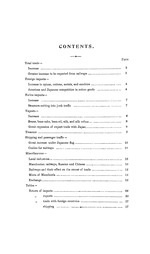 |
“.....................10
Coolies for railways .........................................................................................................1"
Miscellaneous—■
Local industries.........................................................................................u..n 10
Mancliurian railways, Russian and Chinese......................................................10
Railways and their effect oti (lie cdureC of trade .................................................12
Mints of Manchuria ..............................................................................................12
Exchange..........................................................................................................................12
Tables —
Return of imports......................................................................................13
,, exports ..................................-............................................................10
„ trade with foreign countries .„.,....”
|
|
| 2 |
 |
“...opening up of
new fields to agriculture and the facilities of communication soon
to be afforded by railways' in Manchuria will lead to still greater
results. Whether the latter will benefit the port of Newchwang,
and the foreign interests centred there to the extent anticipated
by some, is problematical and will be discussed hereafter ; but
there can be no doubt that the people of Manchuria and the home
manufacturers will be the gainers provided the present con-
ditions of taxation are maintained and preferential railway
rates are discountenanced. The internal taxation of foreign
and domestic trade in Manchuria is light compared with
Central and Southern China, so light, indeed, that transit passes
have rarely been required, and if, in the changes to come, the treaty
tariff present or revised, is guaranteed for this remote" but
exceedingly rich part of China, the future of Manchuria cannot
fail to be prosperous. The increase of 6,082,644' Ha'ik wan
taels (868,949/.) in 1898 as compared'^ with...”
|
|
| 3 |
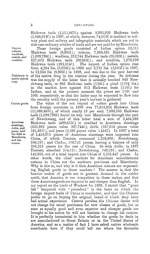 |
“...cottons,
woollens,
metals, and
sundries.
Deficiency in
native opium
crop.
Haikwiin tacls (1,511,067/.) against 8,995,929 Haikwan taels
(1,340,019/.) in 1897, of which, however, 74,012/. is credited to rail-
way plant and railway and telegraphic materials, which are not in
this case ordinary ar ticles of trade and are not paid for by Manchuria.
These foreign goods consisted of Indian opium 02,811
Haikwan taels (8,902/.); cottons, 7,698,585 Haikwan taels
(1,099,798/0 ; woollens, 212,744 Haikwan taels (30,392/.); metals,
taels (89,662/.); and sundries, 1,976,199
627,632 Haikwan
rose
Cotton goods.
American
sheetings,
drills, and
jeans, hold
the field in
Manchuria,
and the
Haikwan taels (282,314/.). The import of Indian opium
from 4,284 lbs. (3,018/.) in 1896 and 3,731 lbs. (2,612/.) in 1897,
to 12,244 lbs. (8,902/.) in 1898, and was due to the poor harvest
of the native drug in the interior during the year. So deficient
was the supply of the latter that it actually touched 940 New-
cliwang...”
|
|
| 4 |
 |
“...NEWCHWANG.
5
sheetings and drills consumed in Manchuria are manufactured,
and they lmvc confessed their entire ignorance of the country of
origin, stating at the same time that they merely indent for their
purchases by the special brand or "chop." I am told that the
proof of the superiority of the American goods is in the washing;
when English goods are washed and the heavy sizing removed they
are very inferior to the American article when similarly treated.
America is at present a successful rival in the heavier manufactured
cottons, and there is nothing to prevent her from entering the
lists against us in the higher grades. The setting up of machinery
i'or the purpose is simply a question of time, and if we are to
regain the ground which we have already lost, and maintain what
is left to us we must manufacture goods equal to and as cheap as
those of our rival. Everything, however, seems to be against us.
The Statistical Secretary of the Imperial Maritime Customs in
his Report on the...”
|
|
| 5 |
 |
“...trade in 1897 and 1898 being 4,838,105 and
3,190,169 Haikwan taels respectively. At this port, with the
single exception of long ells, there was a decrease in every class
of woollen goods in 1898 as compared with 1897, the decline
amounting in value to 41,162 Ilaikwan taels (5,880/.), while the
total import was of the value of only 30,392/. In my report on
the trade of Newchwang for 1895, when I was formerly stationed
here, I gave the reasons why there is no great demand for
woollen goods in Manchuria, and they need not be .repeated
here.
With the.exception of copper sheets and plates and wire, nail-
rod iron, old iron horseshoes and scraps, spelter and tin slabs,
there was an increase in the import of all other kinds of metals
and metal ware, the total value in 1898 being 626,652 Haikwan
taels (89,522/.), against 467,246 Haikwan taels (69,600/.) in 1897,
an increase of 20,000/. Details of the metals imported will be
found in Annex I.
The foreign sundries amounted in value to 1,976,199...”
|
|
| 6 |
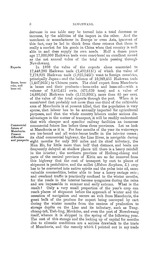 |
“...NEWCHWANG,
Exports.
Beans, btnn-
rake, and
bean-oil.
Commercial
future of
Manchuria.
Present
difficulties
and prospects
decrease in 0110 tabic may be turned into a total decrease or
increase, by the addition of the import in the other. Ami the,
merchant or manufacturer in Europe 'or even Asia, ignorant of
this fact, may be led to think from these returns that there is
really a market for his goods in China when that country is well
able to and does supply its own needs. Half a dozen years
ago 17,000,000 Haikwan taels were considered an excellent record
as the net annual value of the total trade passing through
Newchwang.
In 1898 the value of the exports alone amounted to
17,448,280 Haikwan taels (2,492,611/.) of which the value of
7,1*78,825 Haikwan taels (1,025.540/.) went to foreign countries,
principally Japan—and the balanco of 10,269,455 Haikwan taels
(1,467,065/.) to Chinese ports. The chief export from Manchuria
is beans and their products —bean-cake and bean-oil—with a
volume of 9...”
|
|
| 7 |
 |
“...this report. Before
leaving this subject, however, I should add that the severity of
Mnnchurian winters stops for four months one of the great indus-
tries of the country, the extraction of oil from beans.
In 1897 the export of raw wild silk, the article next in value Sill< a,icl sil,£
in the list of exports from Manchuria through Newchwang, ^f1130-
amounted to 11,061 cwts., of a value of 204,728/., and of silk
refuse to 2,138 cwts. of the value of 8,024/. In 1898 the
figures were, raw wild silk 9,342 cwts. (179,364/.), and refuse
4,692 cwts. (16,891/.). It must not be supposed that these figures
represent the total output of wild silk in Fengtien, the southern
province of Manchuria, to which this industry is practically con-
fined, for silk finds its way by junk clown the Ya-lu, as well as
from several places on the seaboard west of that river. In open-
ing up new agricultural land to the west of the Ya-lu, too, the new
colonists are paying special attention to oak culture, and the zone
of...”
|
|
| 8 |
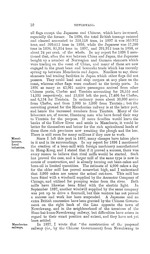 |
“...engaged in the great bean and beancake trade which has recently
sprung up between Manchuria and Japan. Needless to say, these
steamers had trading facilities in Japan which other Hags did not
possess. They could load and ship cargoes at any place on the
coast, whereas other flags were confined to the treaty ports. In
189S as many as 43,961 native passengers arrived from other
Chinese ports, Chefoo and Tientsin accounting for 28,555 and
14,595 respectively, and 23,658 left the port, 17,406 for Chefoo,
and 6,134 for Tientsin. In ordinary years about 30,000 arrive
from Chefoo, aud from 2,000 to 3,000 from Tientsin; but the
recruiting ground for the Manchurian railway is at the latter port,
and hence the increased numbers from Tientsin. Many of the
labourers are, of course, Shantung men who have found their way
to Tientsin for the purpose. If more families would leave the
banks of the Yellow Iliver and settle in Manchuria, it would be
better for themselves and better for the rich agricultural lands...”
|
|
| 9 |
 |
“...NEWCHWANG.
11
Kirin, would give a great impetus to trade aucl its extension Russian and
southwards to Ta-lien-wan bay, just north of Port Arthur, which Chinese.
is open to navigation all the year round, would tend still further
to develop the valuable resources of the whole of Manchuria."
These words were penned after Russia had obtained permission to
join the Trans-Baikal and Southern Ussuri sections of the Trans-
Siberian Railway by a line through the Heilung-chiang and Kirin
provinces, but before the occupation of the south of the Liao-tung
Peninsula, and the construction of a line from Port Arthur to the
Manchurian section of the Trans-Siberian Railway had been
mooted. This southern section is now being built under Russian
auspices, and it is expected that the rails will be laid from Port
Arthur to Moukden by the end of October or beginning of
November of the present year. A branch line runs from this port
(the terminus is nearly three miles from the port) eastwards...”
|
|
| 10 |
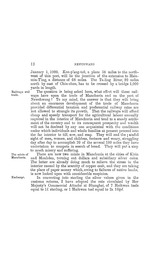 |
“...the trade of Manchuria and on the port of
Newchwang? To my mind, the answer is that they will bring-
about an enormous development of the trade of Manchuria
provided differential taxation and preferential railway rates are
not allowed to strangle its growth. That the railways will afford
cheap and speedy transport for the agricultural labour annually
required in the interior of Manchuria and tend to a steady settle-
ment of the country and to its consequent prosperity and wealth
will not he doubted by any one acquainted with the conditions
under which individuals and whole families at present proceed into
the far interior to till, sow, and reap. They will end the j ainful
sight of men, women, and children, footsore and weary, struggling
day after day to accomplish 20 of the several 100 miles they have
undertaken to compete in search of bread. They will put a stop
to much misery and suffering.
The minis of There are now two mints in Manchuria at the cities of Ivirin
Manchuria. an(j Moukden...”
|
|
| 11 |
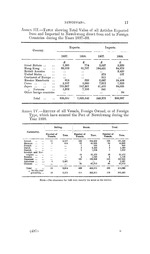 |
“...NEWCUWANG
17
Annex JII.—Table showing Total Value of all Articles Exported
from and Imported to Newchwang direct from and to Foreign
Countries during tlie Years 1897-98.
(-197)
Country. Exports. Imports
1897. 1898. 1897. 1898.
Great Britain .. Hong-Kong British Amcrica United States Continent of Europe .. Russian Manchuria Corea .. Japnn .. ,, Formosa Other foreign countries £ 1,365 60,102 818 2,257 755,907 5,202 £ 774 SI,767 229 8,360 047,261 7,155 £ 2,627 184,421 273 315 6,687 7,912 41,409 241 £ 2,229 84,279 3,429 127 24,408 7,826 84,555 . 34
Total 825,651 ; 1,025,546 243,975 206,887
Annex. IV.—Ketukn of all Vessels, Foreign Owned, or of Foreign Type, which have entered the Port of jNewchwang during the Year 1898.
Sailing. Steam Total.
Nationality. Number of Vessels. Tons. Number of Vessels. T„„„ Number of Ton3- Vessels. Tons.
British ...... 12 German ...... 2 French ...... Dutch ...... Danish ...... Swedish and Nor- wegian ...... Russian ..... Japanese ...”
|
|